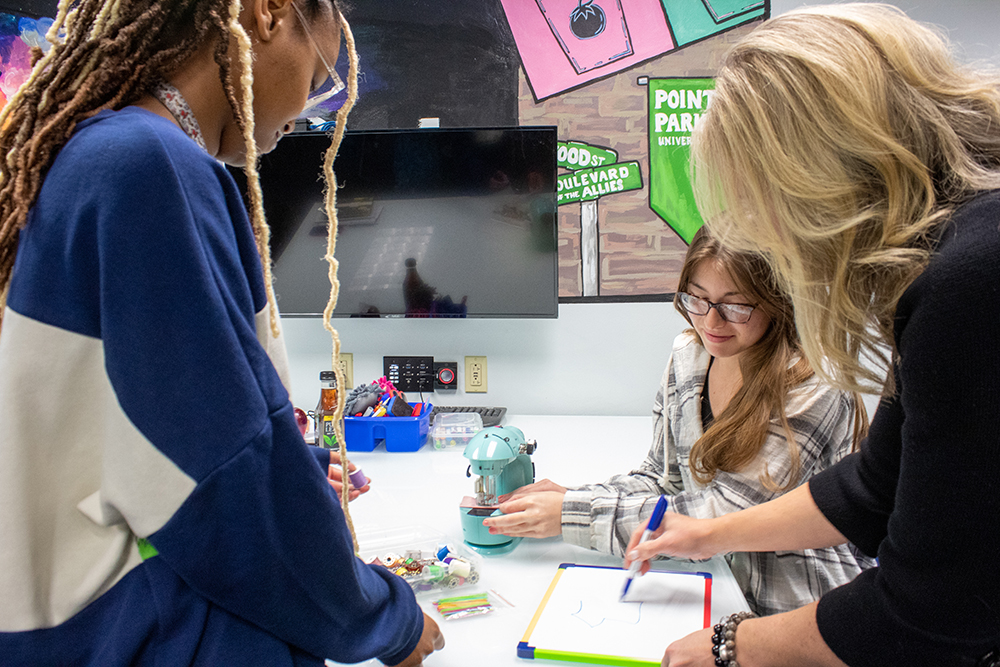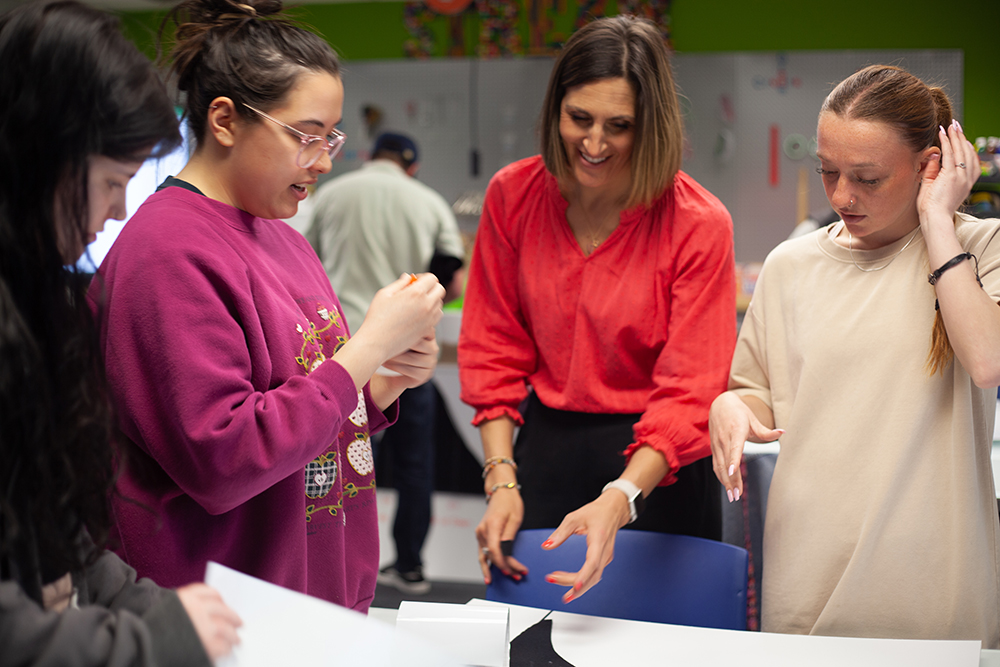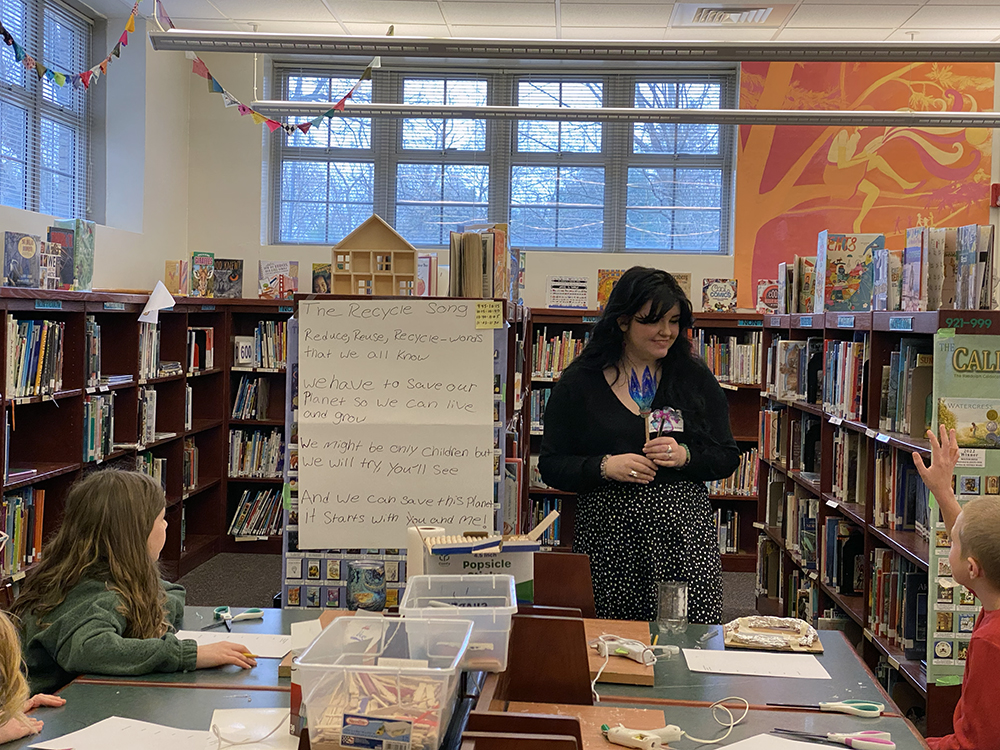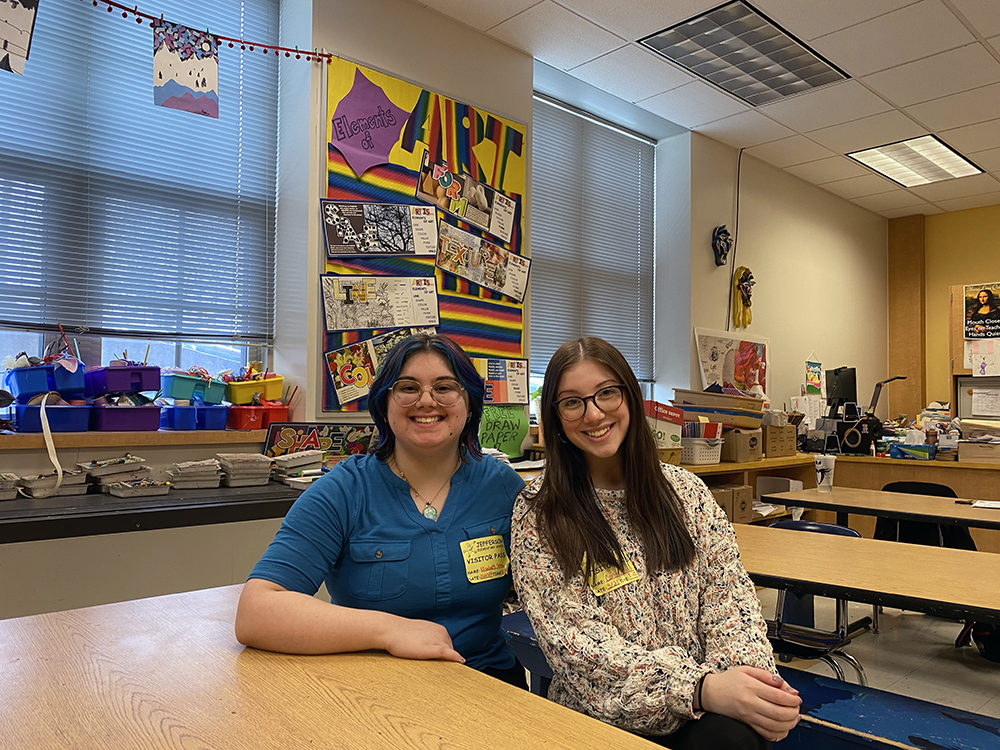School of Education Students Gain Classroom Experience Through Faculty's Maker, STEM Research

Kaitlyn Caiarelli '24, center, utilizes Point Park University's Matt's Maker Space Lab in many of her courses. She is among the students who got to teach their own maker and STEM lessons in local elementary schools this spring as part of a grant the School of Education has used to explore the benefits and implementation of maker and STEM education. Photo by Natalie Caine '25.
"Point Park's emphasis on non-traditional teaching styles and methods beyond the typical landscape prepared me to serve a wide variety of learners. It made me flexible and understanding of the fact that my students will have different backgrounds, needs and motivations. That student-first ideology sets Point Park apart from everyone else."
Point Park University's School of Education gave William Zbozny-Del Percio '10 a valuable headstart in his career.
"Early in my studies, I was exposed to different types of education, like Montessori, Reggio and Waldorf," said Zbozny-Del Percio, who earned a B.A. in Elementary Education and teaches at Jefferson Elementary School. "Methods courses gave me real classroom experiences teaching actual students. But the most important thing Point Park taught me was how to value the students in my classroom. Every professor I had ensured we understood that the student was the center of the classroom and prepared us to teach that way. Even more so, they made me feel like I was valued."
That student-centered approach endures in the School of Education, as well as its focus on equipping students with the latest teaching tools and exposing them early and often to real-world opportunities. Specifically, a $281,830 grant from the National Science Foundation to support the school's research on and implementation of maker and STEM education has afforded Point Park students the chance to create and teach their own maker and STEM lessons in local classrooms. Zbozny-Del Percio helped professors Virginia Chambers, Ed.D., and Kamryn York, Ed.D., facilitate a series of STEM Days in the Mt. Lebanon School District with Point Park students.
"At Point Park, they focus on the learner, both in terms of students in the University's classes and the students that education majors will teach when they get hired at a school," Zbozny-Del Percio said. "Point Park's emphasis on non-traditional teaching styles and methods beyond the typical landscape prepared me to serve a wide variety of learners. It made me flexible and understanding of the fact that my students will have different backgrounds, needs and motivations. That student-first ideology sets Point Park apart from everyone else."
Maker education on campus
The core of maker education aligns with the teaching philosophy of the School of Education, which has its own on-campus Matt's Maker Space Lab.
"We focus on teaching and learning that promotes creativity, collaboration, communication and critical thinking," Dr. Chambers said. "The research we're doing will help the School of Education faculty to best prepare our future teachers to feel confident in their ability to implement maker and STEM education into their teaching effectively."
Dr. York is pleased with how engaged Point Park students have been in expanding their understanding and knowledge of STEM teaching and learning through using maker education practices. She and Dr. Chambers invited Zbozny-Del Percio and a panel of other maker-focused educators on campus to meet with students and brainstorm ideas for their STEM Day lessons.

Glancing up from her notes, elementary education major Ava Cook '24 raised her hand and asked, "Can we make junk robots?"
"Done. I have the materials. Let's go," Zbozny-Del Percio said. It was an endearing moment of collaboration between two generations of Point Park educators.
Having a maker space on campus, stocked with crafty materials and low- and high-tech tools, means students are able to test their ideas, tweak them or reinvent them entirely before taking their STEM lesson plans out into the field. Curiosity and questions are encouraged, and students are empowered to develop new ways of presenting traditional curriculum.
"One of the things I have enjoyed about studying maker space education at Point Park is that it shows us as teachers that students can learn subjects, standards and objectives without just assigning worksheets," Cook said. "When students enter a maker space, they are able to create inventions, bring their classroom activity to life or work with new materials they might have not been exposed to before entering the maker space."

Maker education in the field
For her STEM Day lesson, Cook leaned into a "reduce, reuse, recycle" theme and challenged students to construct robots that could stand for at least 30 seconds, using toilet paper rolls, cardboard boxes, paper cups and more. Cook and her classmates collected data on the efficacy of their lessons to support Point Park faculty's research.
"I feel so grateful to be given the opportunity to go out into the field and teach students about STEM education without the typical, heavy load of worksheets that students might be used to," Cook said. "I am getting an amazing educational experience at Point Park. I talk to friends at other universities and some have never been introduced to a maker space or other topics we discuss in our classes. I feel like I am becoming a more well-rounded teacher, and I now know so many resources and contacts from schools we have created relationships with through field experiences in our courses."
Jason Ramsey '21, principal at Foster Elementary and an alumnus of Point Park's Leadership and Administration program, said, "It's not even a question," when the School of Education approaches him about collaborating to provide Point Park students with classroom experience.
"I know these students are coming to us prepared, professional and ready to learn," Ramsey said.
"This gives the students the opportunity to have some hands-on learning experiences, and it gives our teachers another lens and perspective into some of the modern, current education trends that they can include in their classrooms," said Brett Bielewicz, principal at Jefferson Elementary.

Elizabeth Schrim '24 and Carlina Cutuli '24 were among the School of Education students who taught their own maker and STEM education lessons at Jefferson Elementary School.
Elizabeth Schrim '24, a 4th-8th grade education major, taught students about recycling and insect habitats through her "bug hotel" activity. She presented the poem "Insect Hotel" by Kate O'Neil, tying reading comprehension into the STEM lesson before students crafted their own bug hotels.
"I cut over 200 recycled water bottles for all the students to fill with sticks, leaves and mulch I got from my backyard," she said. "They then took their bug hotels home and placed them somewhere outside their house for bugs to seek refuge from predators."
It was the first lesson Schrim ever taught to students, and her experience affirmed her decision to pursue a teaching career.
"I have enjoyed learning all the different ways maker space education can be included in learning, not just in science or art. It can also be used in math, social studies and English," she said. "Contributing to the School of Education's research means a lot to me. It keeps me wanting to get more and more involved with my school and my education."

